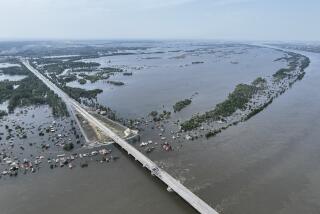Chernobyl Leaves Cloud of Fear Across Europe
- Share via
As a resident of Austria at the time of the Chernobyl disaster, I can only second the comments of Hanne Zens in her article (Editorial Pages, June 12), “Europe’s New Calendar: ‘Before or After Chernobyl.’ ”
She accurately describes the cloud of fear that hung over the population her home town of Cologne, West Germany, in the first few weeks of May. And in Austria, of course, the question as to why strong warnings against the consumption of salad and baby’s milk were first issued on May 5, the day after the presidential election, persists.
The amount of stress caused to the citizenry by the uncertainty as to the real effects of such a nuclear event cannot be underestimated.
After a long and gloomy winter, the trees were finally beginning to bloom and the birds were chirping away once again. But a hike in the forest or a nap in the grass was forbidden. The very air one breathes had an aura of something harmful, but who knew in what degree.
People who had formerly made jokes about nuclear fallout suddenly listened closely to hourly radio reports. And we in Styria were reminded that a nuclear reactor of the same design as Chernobyl was only 20 miles away in Yugoslavia.
I now know what it feels like to be uncomfortable in your own skin, not only for a day or two, but for weeks on end. I am fortunate and can spend the summer in California, where I can eat fresh vegetables and fruits. But in Europe the problem of supplying food will remain of monumental proportions.
In the week after the disaster, one could buy frozen foods and use canned and preserved goods. The stockpile will soon run out and the only produce remaining from domestic and foreign sources will be tainted with radioactivity. What is the housewife/houseman to do when purchasing weekly groceries?
And how does one explain such intricacies to a 6-year-old? He no longer puts everything he sees in his mouth, but he plays with his toy cars on the floor and then rolls in the dust. He runs his hands over his face when something itches, bringing dust closer to nasal passages. When you remind him that the dust is dangerous this week, (and maybe next week, too, and maybe forever) he says that he understands and naturally forgets five minutes later. Most mothers I know are either worried out of their minds or have adopted a fatalistic attitude.
I, myself, as a high school teacher, wanted to send all of the students home for a few days. I felt overwhelmed by the situation. One or two times I simply gave the students work projects to do in class. After a few days, however, we began to discuss the events as they were taking place, on a very limited basis.
I never did manage to analyze a Newsweek article about the disaster with them. I was afraid I would panic in the middle of the lesson and make the students even more sacred than they already were.
I am not sure if my comments can give any idea of the scope of fear and worry that enveloped Europe in the weeks after Chernobyl. I only know that we must change the direction of energy policy to eliminate nuclear reactors, not to mention the specter of nuclear weapons. We can and we must eliminate the nuclear threat on all fronts if we want our future generations to enjoy the years to come.
LAURA C. CURRAN
Yorba Linda
More to Read
Sign up for Essential California
The most important California stories and recommendations in your inbox every morning.
You may occasionally receive promotional content from the Los Angeles Times.













